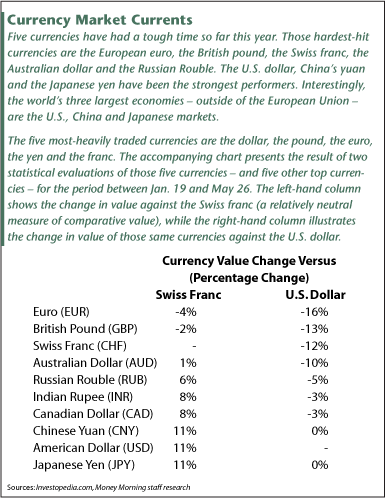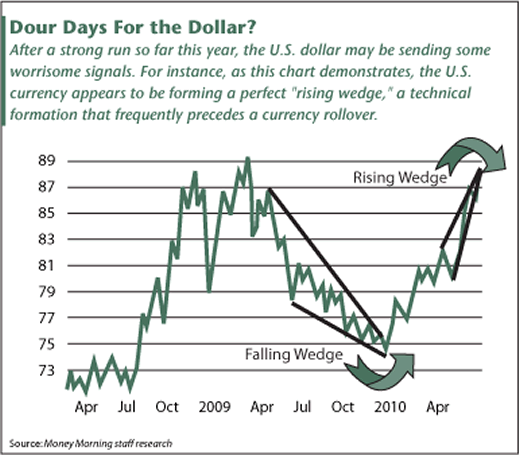Is it Time to Bet Against the U.S. Dollar?
Currencies / US Dollar Jun 27, 2010 - 02:20 AM GMTBy: Money_Morning
 Keith Fitz-Gerald writes: The U.S. dollar has been one of the world's strongest currencies in the first part of 2010.
Keith Fitz-Gerald writes: The U.S. dollar has been one of the world's strongest currencies in the first part of 2010.
And it's no wonder. The Greek debt crisis continues to threaten Europe's overall health, and could unleash an entirely new contagion on the rest of the global economy. Then there's China, - the engine of world growth during much of the financial crisis - which now appears to face the near-term triple threat of slowing growth, accelerating inflation and workplace unrest. Add in concerns about commodity prices and global debt levels and it's easy to see why currency investors have sought the safe haven of the U.S. dollar.
But is the greenback really the best choice for safety, quality and security?
To me, the dollar is looking more and more like a colossal short that could wind up being one of the biggest moneymakers of the year for traders gutsy enough to take a stand.
Read on to find out why it's time to bet against the dollar... I'll show you the best ways to do it.
From Leader to Laggard?
Given that the dollar soared 11% through the end of May , I'm sure some experts will call me crazy for going against the dollar at this point in history. But here's my thinking:
 •Our $14 trillion fiscal hangover, weaker-dollar policies and increased spending will lead to additional dollar weakness in the immediate term. Longer-term, this is a foregone conclusion: The high debt load relative to U.S. gross domestic product will erode growth - studies prove this - and all the extra money that we've printed will fuel inflation, as always happens..
•Our $14 trillion fiscal hangover, weaker-dollar policies and increased spending will lead to additional dollar weakness in the immediate term. Longer-term, this is a foregone conclusion: The high debt load relative to U.S. gross domestic product will erode growth - studies prove this - and all the extra money that we've printed will fuel inflation, as always happens..
•Foreign central bankers - especially China - are actively diversifying away from dollar reserves and dollar-denominated securities. They can't and won't "dump" the dollar in a wholesale manner. But this shift away is nothing less than a long-term decrease in demand for the dollar - and we all know that when demand for an asset declines, so does its value.
•The Organization of the Petroleum Exporting Countries (OPEC) - and what's left of the non-OPEC nations - are still pressing for non-dollar-denominated oil deals. Expect some of those deals to take place in the wake of the BP PLC (NYSE ADR: BP) Deepwater Horizon disaster, which will bring about major regulatory changes and cause onshore reserves to command a major premium. This group, incidentally, isn't to be dismissed, given that it contains such heavyweights as China, Japan, Russia, most of the Arab nations and, of course, France.
•If you look at the following chart of the U.S. dollar, you can see that appears to be forming a perfect "rising wedge," a technical formation and a bearish signal that frequently precedes rollovers. That's the opposite of a "falling wedge," a bullish signal that presages reversals to the upside.
How to Play the Dollar's Reversal
It's worth noting here that this wager against the U.S. dollar should be viewed for just what it is - a highly speculative trade. This means it's only for aggressive traders.

Keep in mind, too, that the dollar won't shed its reputation as the currency of last resort without a struggle. Negative events abroad could send investors back into the currency for short stretches, making the dollar prone to short, rapid increases in value, despite its highly flawed underpinnings.
Position traders and everyday investors will probably want to wait for confirmation that the dollar's trend is, indeed, reversing. We've seen some of that in the past two days but more is probably on the way. You'll miss out on some returns but that's the way the game is played - you have to act on your convictions or else you're simply another wannabe in this business.
My suggestion is that any speculative trade be limited to 2% of investable capital. That way, if we're wrong and the dollar doesn't cooperate, the risk to your portfolio is minimized.
As for suitable ways to play this dour-dollar prediction, I can think of three:
1.Go for the Gold: This is so obvious that I'm almost deterred from suggesting it, especially since the yellow metal is once again trading near its all-time highs. Generally speaking, I don't like buying anything at all-time highs, meaning that pullbacks are the key here. I expect $2,000-an-ounce gold within the next couple of years - and possibly sooner - depending on how central bankers choose to deal with the EU and how the U.S. Federal Reserve handles the recovery bailout "exit" strategies it's alluded to in recent months.
2.Take "The Natural" Approach: By "natural approach," I'm referring, of course, to natural resources. The BP situation - coupled with new drilling restrictions and increasing Third World demand - is going to push the price of oil and other resources much higher. It's not clear which one pulls or pushes lately - the U.S. dollar or oil - but when one moves the other generally heads in the opposite direction immediately. So watch the relationship between the two carefully to spot when this trend gets under way. Be prepared for some volatile trading, though. Silver, gold and other resources can move 5%, 8% and even 10% in a single day.
3.Cash in on Currency Funds: It used to be that the dollar and the euro were the world currency market's "dynamic duo" - when one went, you could count on trading the other. But I think that relationship is long gone. The money has now shifted across the Atlantic, headed through the U.S. economy, and headed straight for Asia. As a result, instead of shorting the euro, I'm now inclined to short the dollar, while being generally long on the Hong Kong dollar, the Australian dollar and even the Chinese yuan.
Source: http://moneymorning.com/2010/06/10/u.s.-dollar/
Money Morning/The Money Map Report
©2010 Monument Street Publishing. All Rights Reserved. Protected by copyright laws of the United States and international treaties. Any reproduction, copying, or redistribution (electronic or otherwise, including on the world wide web), of content from this website, in whole or in part, is strictly prohibited without the express written permission of Monument Street Publishing. 105 West Monument Street, Baltimore MD 21201, Email: customerservice@moneymorning.com
Disclaimer: Nothing published by Money Morning should be considered personalized investment advice. Although our employees may answer your general customer service questions, they are not licensed under securities laws to address your particular investment situation. No communication by our employees to you should be deemed as personalized investent advice. We expressly forbid our writers from having a financial interest in any security recommended to our readers. All of our employees and agents must wait 24 hours after on-line publication, or 72 hours after the mailing of printed-only publication prior to following an initial recommendation. Any investments recommended by Money Morning should be made only after consulting with your investment advisor and only after reviewing the prospectus or financial statements of the company.
Money Morning Archive |
© 2005-2022 http://www.MarketOracle.co.uk - The Market Oracle is a FREE Daily Financial Markets Analysis & Forecasting online publication.



